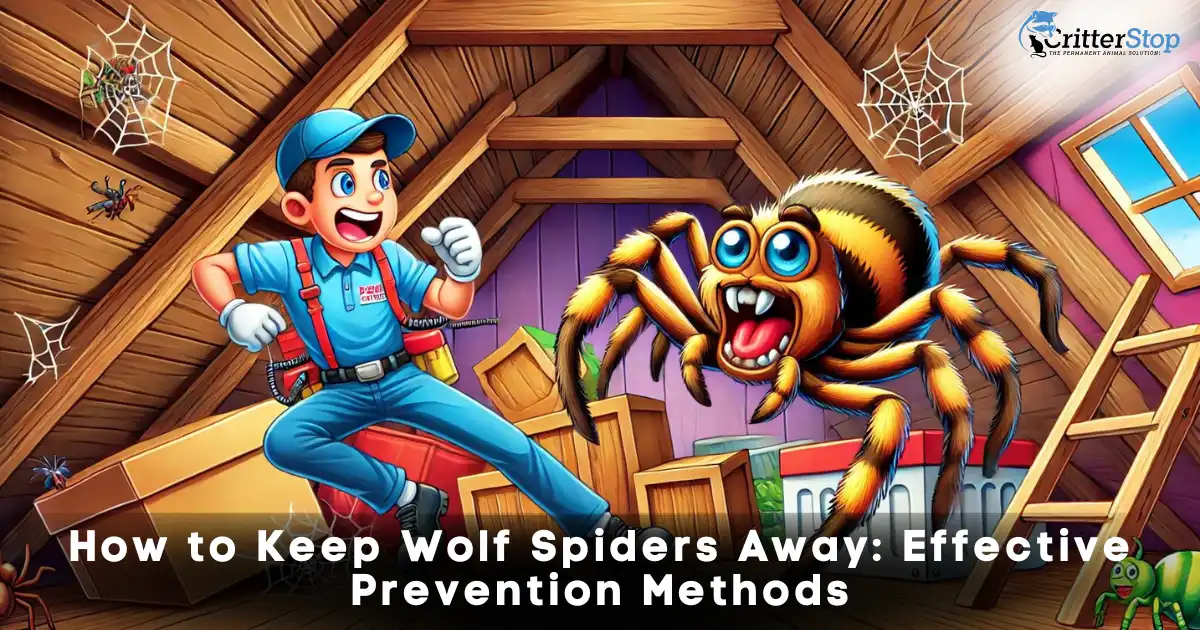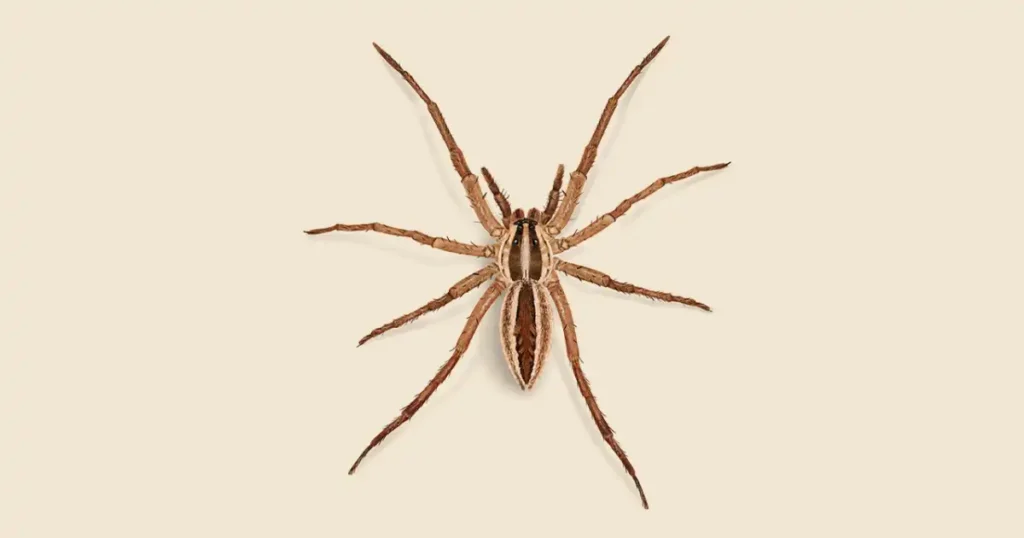
When they visit gardens and homes, wolf spiders can be quite unnerving. These large, hairy arachnids are known for their speed and hunting prowess. While generally harmless to humans, their presence often causes discomfort. Keep reading to learn how to keep wolf spiders away.
Sealing entry points, clearing clutter, and keeping your surroundings clean both inside and outside will help keep wolf spiders at bay. These measures make your space less appealing to these eight-legged creatures. Regular cleaning and decluttering eliminate potential hiding spots and food sources.
Applying natural repellents around windows, doors, and other possible entry points, such as vinegar or peppermint oil, can work as an efficient deterrent. Reducing outdoor lighting near entrances also helps, as it attracts fewer insects that wolf spiders prey upon.

Wolf spiders are common household pests that can be intimidating due to their size and appearance. These arachnids have unique characteristics and behaviors that influence their presence in and around homes.
Wolf spiders prefer dark, secluded areas with plenty of hiding spots. Crawl spaces, garages, and basements are common places to find them. These spiders are ground-dwellers, rarely climbing walls or spinning webs.
Outdoors, wolf spiders inhabit gardens, woodpiles, and leaf litter. They do well in habitats where small invertebrates and insects are common prey. Grassy areas and rock piles provide ideal hunting grounds for these nocturnal predators.
Moisture is another key factor in wolf spider habitats. They are drawn to damp environments, making areas near water sources attractive to them.

Several factors can make homes appealing to wolf spiders. Clutter and excessive storage provide numerous hiding spots, attracting these arachnids. Cardboard boxes, stacks of newspapers, and heaps of clothes are super tempting.
Cracks and crevices in walls, foundations, and around windows serve as entry points for wolf spiders. Sealing these openings can significantly reduce their presence indoors.
Food sources play a crucial role in attracting wolf spiders. Homes with insect infestations become prime targets. Reducing the population of other pests can make your house less appealing to these predatory spiders.
Outdoor lighting near entry points can inadvertently lure wolf spiders inside. These lights attract insects, which in turn draw spiders looking for prey.
Effective strategies can help keep wolf spiders at bay. These methods aim to make your home less appealing to these arachnids and reduce their entry points.
Seal the voids and fissures in the walls, foundation, and areas surrounding windows and doors of your house. To seal these openings, use weatherstripping or caulk. Put in place fine mesh screens on vents and windows to keep wolf spiders out.
Cut back on outdoor lighting near entrances because wolf spiders feed on the insects that are attracted to it. Instead of using white lights, think about utilizing sodium vapor or yellow lights.
Use essential oils such as peppermint, tea tree, or citrus to create a barrier around your house. The presence of these organic barriers can deter wolf spiders from coming near.
Clear out the clutter from your home's exterior as well. Wolf spiders prefer hiding in piles of wood, leaves, or debris. Keep storage areas organized and elevate boxes off the floor.
Regularly vacuum and sweep floors, paying special attention to corners and baseboards. Dust and clean behind furniture and appliances where spiders might hide.
Trim vegetation near your home's exterior. Keep grass short and remove thick ground cover near the foundation. Prune shrubs and trees to prevent branches from touching the house, as these can serve as bridges for spiders to enter.

Natural methods can effectively deter wolf spiders from entering your home. These solutions are safe for people and pets and keep spiders away.
Several essential oils repel wolf spiders. Peppermint oil is particularly effective. In a spray bottle, mix 10 to 15 drops with water. Then, spray around windows, doors, and other places that bugs could get in. You can also use tea tree oil or lavender oil.
Herbs like mint, basil, and rosemary naturally repel spiders. Plant them in your garden or keep potted herbs near entry points. Dried herbs in sachets placed in drawers or closets can deter spiders indoors.
Citrus peels contain d-limonene, a compound spiders dislike. Place lemon or orange peels in areas where wolf spiders frequent.
Vinegar is an excellent natural repellent. In a spray bottle, mix water and white vinegar together until they are equal. Apply this solution around your home's perimeter and potential entry points.
Wolf spiders can't live in diatomaceous earth, a natural powder made from fossilized algae. Sprinkle it along baseboards, windowsills, and other areas where spiders may enter.
There is a chemical in chestnuts that keeps spiders away. Put some in corners or near places where people can get in. Every few weeks, you should get new ones to keep them working well.
Cedar wood and cedar oil naturally repel spiders. Use cedar mulch in garden beds near your home or cedar oil in a diffuser indoors.

Effective physical barriers prevent wolf spiders from entering homes. These methods focus on blocking spiders' ways in and trapping any that get through.
Install tight-fitting screens on windows and doors to block spider entry. Use fine mesh screens with openings smaller than 1/4 inch to ensure effectiveness against wolf spiders. Check screens regularly for tears or gaps and repair promptly.
Apply weatherstripping around doors and windows to seal small cracks. Use door sweeps on exterior doors to close gaps at the bottom. Caulk around utility lines, pipes, and cable entries to eliminate potential access points.
Trim vegetation away from the house exterior. Maintain a clear perimeter of at least 18 inches to reduce hiding spots near entry points. Remove piles of wood, rocks, or debris from around the foundation.
Place glue traps along baseboards, corners, and areas where spiders are frequently seen. Spiders walk right into these sticky traps and get caught. For the best results, check and replace traps often.
Use pheromone-based glue traps to attract male wolf spiders during mating season. Position these traps near entry points and in dark, quiet areas where spiders are likely to travel.
Add glue traps to other exclusion methods for complete spider control. Place traps strategically in garages, crawlspaces, and basements. Use glue traps carefully in homes with pets or small children to avoid contact.
Chemical solutions offer effective ways to deter wolf spiders from entering homes and outdoor spaces. These methods include various sprays and insecticides designed to repel or eliminate these arachnids.
Several chemical products can help keep wolf spiders at bay. Pyrethrin-based sprays are popular due to their quick action and relatively low toxicity to mammals. These sprays disrupt the spiders' nervous systems, effectively repelling them from treated areas.
Synthetic pyrethroids, such as deltamethrin and cypermethrin, offer longer-lasting protection. These compounds can be applied around entry points, baseboards, and other areas where wolf spiders commonly travel.
Silica gel and diatomaceous earth are less toxic alternatives. These substances damage the spiders' exoskeletons, causing dehydration. They can be dusted in cracks, crevices, and along baseboards.
When using chemical solutions, safety should be a top priority. Pay attention to label instructions. Use gloves and a mask when applying insecticides.
Children and pets should stay away from treated areas until it dries. Chemicals should be kept in their original containers away from children and animals.
Consider using targeted applications rather than broad spraying to minimize environmental impact. Avoid applying chemicals near water sources or areas frequented by beneficial insects.
If unsure about proper application or safety measures, consult a professional pest control service. They can provide expert advice and ensure safe, effective treatment for wolf spider control.
Regular inspections are crucial for detecting and preventing wolf spider infestations. These checks help identify potential entry points and habitats that attract these arachnids.
For the purpose of controlling wolf spiders, professional pest control services provide in-depth inspections and focused treatments. Experts can identify spider species and their preferred habitats within homes. They use specialized tools to inspect hard-to-reach areas like attics, crawl spaces, and wall voids.
Pest control professionals apply safe, effective treatments to deter wolf spiders. These may include barrier sprays around the home's perimeter and targeted applications in problem areas. They can also provide recommendations for ongoing prevention.
Regular professional inspections, typically scheduled quarterly or bi-annually, help maintain a spider-free environment. These visits allow for early detection of new infestations and prompt treatment.
Effective landscape management plays a crucial role in deterring wolf spiders from residential areas. Implementing strategic changes to outdoor lighting and vegetation can significantly reduce their presence.
Wolf spiders are attracted to bright lights that draw in their insect prey. Homeowners can modify their exterior lighting to make their property less appealing to these arachnids.
Replace bright white bulbs with yellow or sodium vapor lights. These release wavelengths that are less alluring to insects, so providing the spider with less food.
Install motion-activated lights instead of constant illumination. This limits the time lights are on, decreasing the chance of attracting spiders.
Position lights away from entry points like doors and windows. This is a useful tip on how to prevent wolf spiders.
Proper garden maintenance creates an environment less hospitable to wolf spiders. Regular landscaping practices can minimize their hiding spots and food sources.
Trim bushes and shrubs regularly, especially those close to the house. This reduces potential shelter for spiders.
Clear the area surrounding the foundation of debris, mulch, and leaf litter. Wolf spiders can easily hide among these materials.
Maintain neat and short grass. Regularly mow the lawn to get rid of the tall grass that attracts spiders.
Avoid overwatering the garden. Excess moisture attracts insects, which in turn attract spiders.
Use cedar mulch in garden beds. Its natural properties repel many insects and spiders.
Implementing consistent practices and modifying the environment can significantly reduce wolf spider populations around homes. These approaches focus on creating conditions that are less attractive to these arachnids.
Regular cleaning is crucial for deterring wolf spiders. Vacuum floors, carpets, and corners weekly to remove potential prey insects. Declutter storage areas, basements, and garages to eliminate hiding spots.Use weatherstripping or caulk to seal any gaps and cracks in walls, foundations, and the areas surrounding windows and doors.
Keep your yard neat by cutting the grass short and getting rid of any debris, wood, or leaf piles. In order to decrease entry points, trim trees and bushes away from the house. Install screens on doors and windows that fit tightly.
Use outdoor lighting wisely. Replace white bulbs with yellow "bug lights" to attract fewer insects. Position lights away from entrances to avoid drawing spiders towards the house.
Consider using natural repellents like peppermint oil or vinegar solutions around entry points. Reapply these regularly for continued effectiveness.
Wolf spiders can be a nuisance in homes. Here are some common questions about keeping these arachnids at bay.
Sealing cracks and crevices in walls and foundations is crucial. Install weatherstripping around doors and windows. Keep vegetation trimmed away from the house exterior. Use yellow or sodium vapor lights outdoors, as these attract fewer insects that wolf spiders prey on.
Peppermint oil is a natural spider repellent. Mix 10-15 drops with water in a spray bottle and apply around entry points. Vinegar solutions can also deter spiders. Sprinkle diatomaceous earth along baseboards and windowsills to create a barrier.
Clutter provides hiding spots for wolf spiders. Woodpiles, leaf litter, and dense vegetation near homes attract these arachnids. Outdoor lighting draws insects, which in turn attract spiders seeking prey. Moisture problems can also make areas more appealing to wolf spiders.
Vacuum spiders and egg sacs thoroughly. Use sticky traps in corners and along walls to capture spiders. A mixture of dish soap and water sprayed directly on spiders can immobilize them for easy removal. These methods avoid harmful chemicals while effectively managing wolf spider populations indoors.
Eucalyptus, tea tree, and lavender oils have spider-repelling properties. Citrus scents can also deter spiders. Place cotton balls soaked in these essential oils in problem areas. Refresh the scent every few days for continued effectiveness.
While some insecticides can kill wolf spiders on contact, they may not provide long-term control. Many spiders can detect and avoid areas treated with chemical sprays. Non-residual sprays require direct contact to be effective. For persistent problems, consider contacting a pest control professional for targeted treatments.
Critter Stop is a professional wildlife removal company that specializes in humane pest control solutions. They offer expert services for addressing spider infestations, including wolf spiders.
To schedule a free inspection, homeowners can call Critter Stop at (214) 234-2616. Their trained technicians will assess the situation and provide tailored recommendations.
Critter Stop's team uses safe, effective methods to remove spiders and prevent future infestations. They focus on long-term solutions rather than quick fixes.
The company has earned a stellar reputation for its high-quality work and exceptional customer service. This is reflected in their numerous positive online reviews from satisfied clients.
When dealing with persistent spider problems, professional help can make a significant difference. Critter Stop's expertise ensures thorough treatment and lasting results.
By contacting Critter Stop, homeowners can rest assured that their spider concerns will be addressed promptly and efficiently. The company's commitment to customer satisfaction sets them apart in the pest control industry.
Visit our Critter Library and learn more about our furry friends